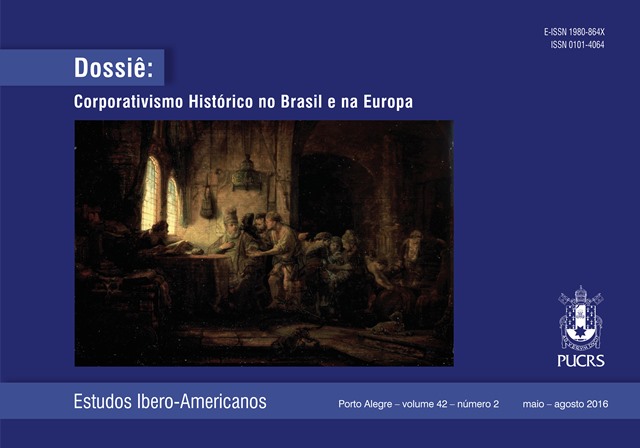Politics is the weapon of the business: the role of USA government and the corporations in Chile’s dictatorship
DOI:
https://doi.org/10.15448/1980-864X.2016.2.22892Keywords:
Chile, military dictatorship, USA, businessAbstract
This paper addresses the relations between the US government and north-american and Chilean conglomerates, unveiling their role overthrowing Allende’s government and sustaining the dictatorship in Chile. We start by presenting a theoretical discussion highlighting the relationship between public power and private interest, which influences policymaking. Second, an analysis of the social construction of the dictatorship in Chile is presented, connected to the contemporary dynamics of capitalism, characterized by the transnationalization of production, politics, ideologies and mentalities.
Downloads
References
AGGIO, Alberto. Democracia e Socialismo: a experiência chilena. São Paulo: Unesp, 1993.
ARENDT, Hannah. Origens do totalitarismo: anti-semitismo, imperialismo, totalitarismo. São Paulo: Cia das letras, 1989.
ARRIAGADA, Genaro. La política militar de Pinochet. Santiago: Salesianos, 1985.
BÉDARIDA, François. L’histoire de la résistance: lectures d’hiers, chantier de demain. Vingtième Siècle, n. 11, p. 75-90, juillet-septembre, 1986.
BROZSAT, Martin. The Hitler State: the foundation and development of the internal CAMPERO, Guillermo. Los gremios empresariales en el periodo 1970-1983: comportamiento sociopolítico y orientaciones ideológicas. Santiago: El Grafico, 1984.
DOMHOFF, G .William. The higher circles. New York: Random House, 1971.
DREIFUSS, R. A internacional capitalista: estratégias e táticas do empresariado transnacional 1918-1986. Rio de Janeiro: Espaço e tempo, 1986.
FISHER, Karin. The influence of neoliberals in Chile before, during and after Pinochet. In: MIROWSKI, Philip; PLEHWE, Dieter (Org.). The road to Mont Pelerin: the making of the neoliberal thought collective. Boston: Harvard Univ Press, 2009. 305-346.
FONTANA, Josep. História, análise do passado e projeto social. Bauru: Edusc, 1998.
GARRETON, Manuel A. Mobilizações populares, regime militar e transição para democracia no Chile. Lua Nova: Revista de Cultura e política, São Paulo, n. 16, p. 87-102, mar. 1989.
GARRETON, Manuel A.; MOULIAN, Tomás. La Unidade Popular y el conflicto politico en Chile. Santiago: LOM Ediciones, 1983.
GUERIN, Daniel. Fascismo y Gran Capital. Madrid: Editorial Fundamentos, 1973.
GRAMSCI, Antonio. Cadernos do Cárcere. Rio de Janeiro: Civilização Brasileira, 2002. Vol. 3.
HUNTINGTON, Samuel. O soldado e o Estado: teoria e política das relações entre civis e militares. Rio de Janeiro: Bibliex, 1996.
KERSHAW, Ian. Hitler: um perfil do poder. Rio de Janeiro: Zahar, 1993.
KLEIN, Naomi. The Shock Doctrine: the rise of disaster capitalism. New York: Picador, 2008.
KORNBLUH, Peter. The Pinochet File: a declassified dossier on atrocity and accountability. New York: The New Press, 2003.
LABORIE, Pierre. Os franceses do pensar-duplo. In: ROLLEMBERG, D.; QUADRAT, S. (Orgs.). A construção social dos regimes autoritários. Rio de Janeiro: Civilização Brasileira, 2010. Vol. 1. p. 31-44.
MOMMSEN, Hans. National Socialism: continuity and change. In: LAQUEUR, W. Fascism: a reader’s guide. New York: Penguin Books, 1979.
O’CONNOR, James. USA: a crise do Estado capitalista. Rio de Janeiro: Paz e Terra, 1977.
O’BRIAN, Phil; RODDICK, Jackie. Chile: The Pinochet decade: the rise and fall of the Chicago Boys. London: Latin America Bureau, 1983.
PAXTON, Robert. A anatomia do fascismo. São Paulo: Paz e Terra, 2007.
PETRAS, James; VIEUX, Steve. The Chilean “economic miracle”: an empirical critique. Critical Sociology, v. 17, p. 2, Summer 1990.
POULANTZAS, Nicos. O Estado, o poder, o socialismo. Rio de Janeiro: Graal, 1985.
QUADRAT, Samantha. Para Tata, com carinho! In: AZEVEDO, C.; ROLLEMBERG, D.; KNAUSS, P.; BICALHO, M. F.; QUADRAT, S. (Orgs.). Cultura política, memória e historiografia. Rio de Janeiro: FGV, 2009. 399-418.
______. Ditadura, violência política e direitos humanos na Argentina, no Brasil e no Chile. In: AZEVEDO, C.; RAMINELLI, R. História das Américas: novas perspectivas REICH, Wilhelm. Psicologia de massas do fascismo. Porto: Escorpião, 1974.
REIS, Daniel Aarão. Ditadura, anistia e reconciliação. Estudos Históricos, Rio de Janeiro, v. 23, n. 45. p. 171-186, jan.-jun. 2010.
______. Ditadura militar, esquerdas e sociedade. Rio de Janeiro: Zahar, 2005.
ROLLEMBERG, Denise; QUADRAT, Samantha (Orgs.). A construção social dos regimes autoritários: legitimidade e consenso no século XX. Rio de Janeiro: Civilização Brasileira, 2010. Vol. 1.
SAMPSON, Anthony. The Sovereign State: the secret history of ITT. London: Hodder and Stoughton, 1973.
SCHRIFTGIESSER, Karl. Business comes of age: the story of the Committee for Economic Development and its impact upon the economic policies of the United States 1942-1960. New York: Harper and Brothers, 1960.
SILVA, Patricio. The politics of neo-liberalism in Latin America: legitimacy, depoliticization and technocratic rule in Chile. In: ROBINSON, Richard (Ed.). The Neo-Liberal Revolution. London: Palgrave, 2006. p. 39-57.
SILVA, Eduardo. The State and the Capital in Chile: business elites, techonocrats and market economics. Boulder: Wetsview, 1996.
TIRONI, Eugenio; MARTINEZ, Javier. Las classes sociales en Chile: cambio y estratificación 1970-1980. Santiago: Sur, 1985.
VALDES, Juan Gabriel. Pinochet’s economists: the Chicago School of economics in Chile. Cambridge: Cambridge Univ. Press, 1995.
VALENZUELA, Arturo. Los militares en el poder. In: DRAKE, P; JAKSIC, I. El difícil camino a la democracia en Chile. Santiago: Flacso, 1993. p. 57-144.
WOLFE, Alan. America’s Impasse: the rise and decline of growth politics. New York: Pantheon, 1981.
WOODIWISS, Michael. Capitalismo Gangster: quem são os verdadeiros agentes do crime organizado. Rio de Janeiro: Ediouro, 2007.
ZÁRATE, Verónica Valdivia. Estatismo y Neoliberalismo: un contraponto militar. Chile 1973-1979. Historia. Vol. 34. Santiago, 2001.
Downloads
Published
How to Cite
Issue
Section
License
Copyright (c) 2016 Tatiana Poggi

This work is licensed under a Creative Commons Attribution 4.0 International License.
Copyright
The submission of originals to Estudos Ibero-Americanos implies the transfer by the authors of the right for publication. Authors retain copyright and grant the journal right of first publication. If the authors wish to include the same data into another publication, they must cite Estudos Ibero-Americanos as the site of original publication.
Creative Commons License
Except where otherwise specified, material published in this journal is licensed under a Creative Commons Attribution 4.0 International license, which allows unrestricted use, distribution and reproduction in any medium, provided the original publication is correctly cited.






